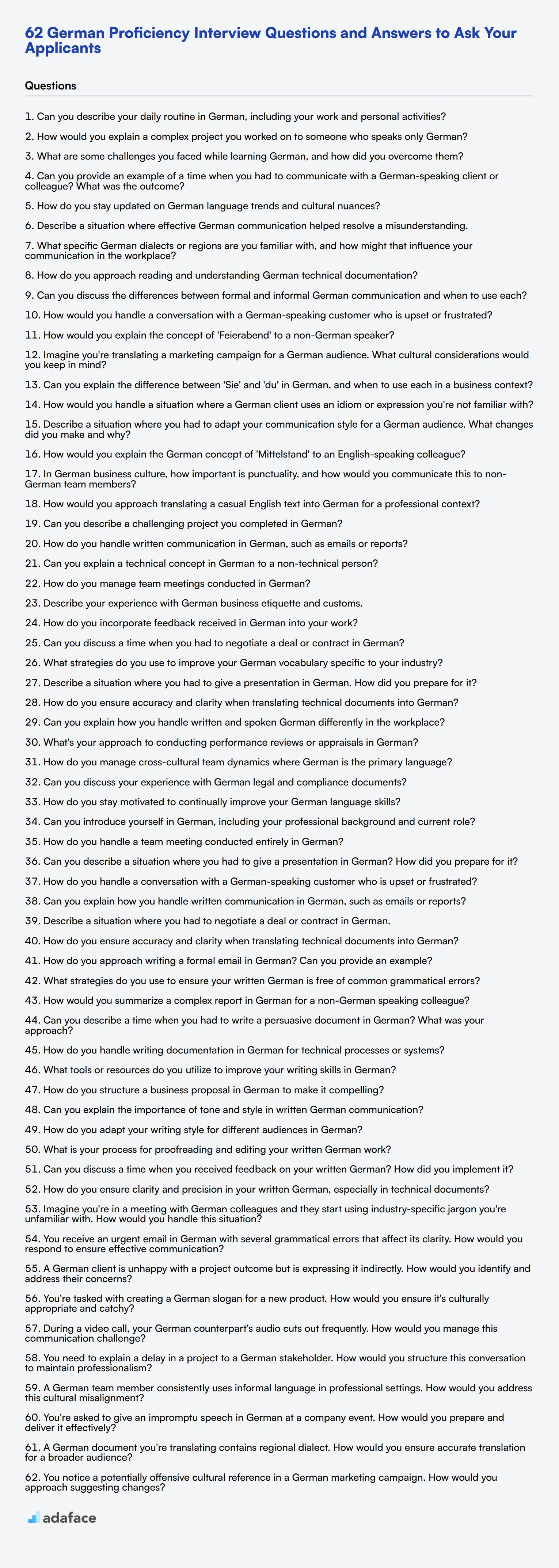As a recruiter or hiring manager, determining an applicant's German proficiency can be a challenging task. The right questions can help identify the best candidates and ensure they meet your language requirements, especially when hiring for roles that demand high linguistic competency.
This blog post covers a wide range of German proficiency interview questions, including common queries, questions for junior and mid-tier specialists, as well as situational and skill-specific questions. It aims to provide you with the tools you need to evaluate candidates effectively and ensure you are making informed hiring decisions.
By using these questions, you can streamline your interview process and identify top talent whose language skills align with your organizational needs. For a more thorough evaluation, consider administering a German proficiency test before the interview stage.
Table of contents
10 common German Proficiency interview questions to ask your applicants
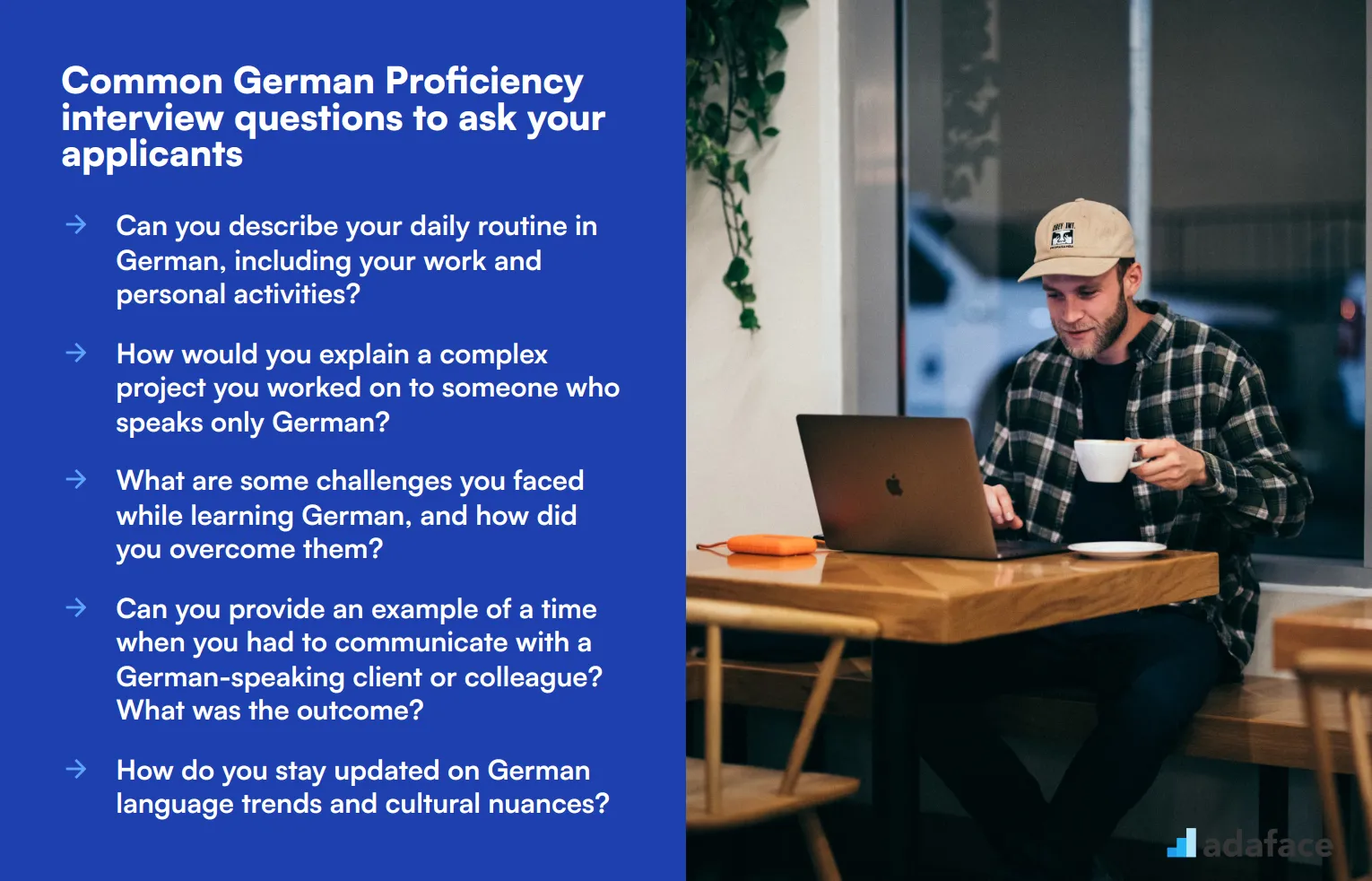
To assess whether your applicants possess the necessary German language skills, utilize this list of common interview questions. These queries can help you gauge proficiency levels effectively during the interview process, ensuring you find the right fit for your team.
- Can you describe your daily routine in German, including your work and personal activities?
- How would you explain a complex project you worked on to someone who speaks only German?
- What are some challenges you faced while learning German, and how did you overcome them?
- Can you provide an example of a time when you had to communicate with a German-speaking client or colleague? What was the outcome?
- How do you stay updated on German language trends and cultural nuances?
- Describe a situation where effective German communication helped resolve a misunderstanding.
- What specific German dialects or regions are you familiar with, and how might that influence your communication in the workplace?
- How do you approach reading and understanding German technical documentation?
- Can you discuss the differences between formal and informal German communication and when to use each?
- How would you handle a conversation with a German-speaking customer who is upset or frustrated?
8 German Proficiency interview questions and answers to evaluate junior language specialists
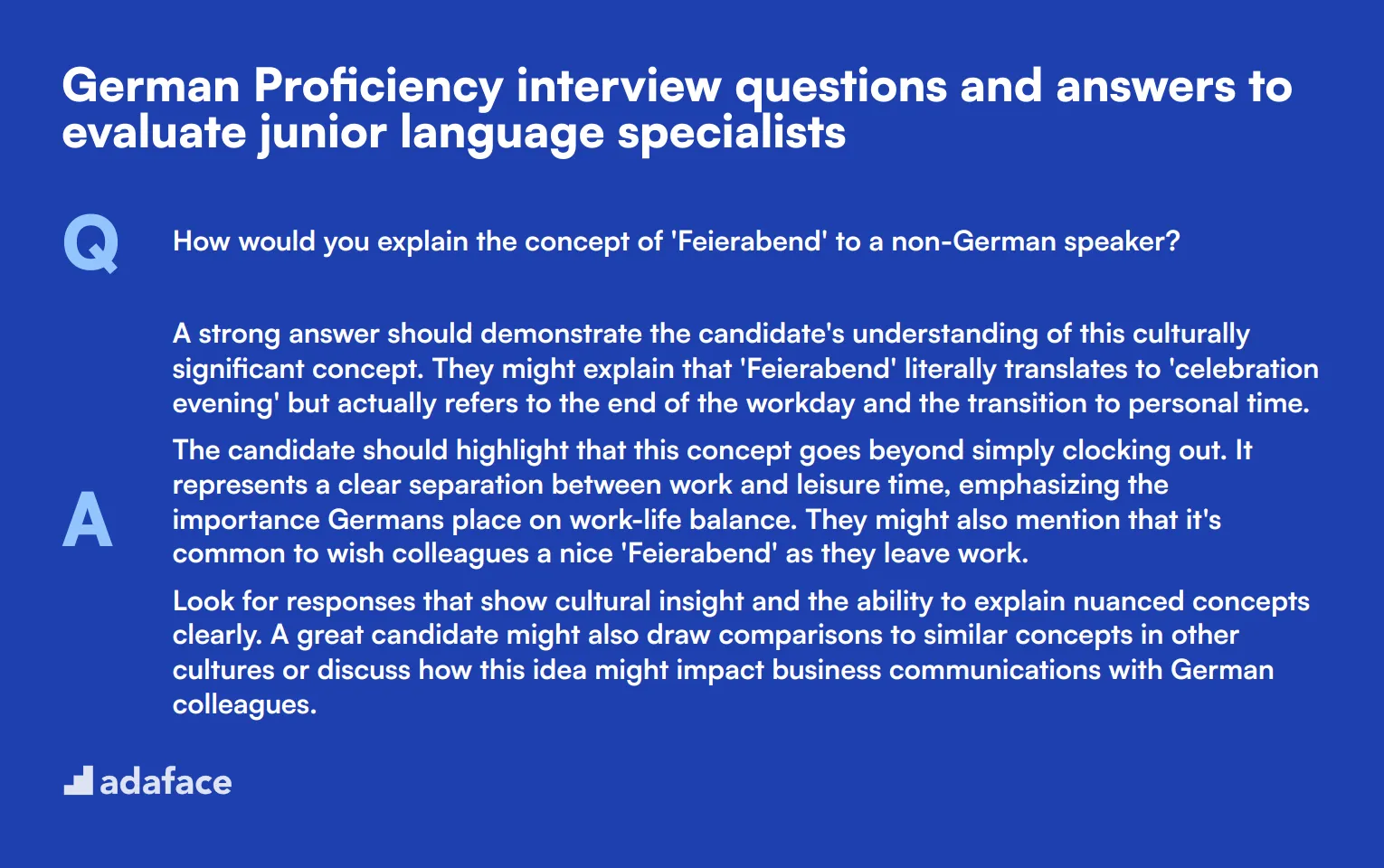
Ready to put your German language specialists to the test? These eight interview questions will help you evaluate junior candidates' proficiency and cultural understanding. Use them to assess language skills, problem-solving abilities, and cultural awareness in a real-world context. Remember, the goal is to find someone who can communicate effectively in German business settings.
1. How would you explain the concept of 'Feierabend' to a non-German speaker?
A strong answer should demonstrate the candidate's understanding of this culturally significant concept. They might explain that 'Feierabend' literally translates to 'celebration evening' but actually refers to the end of the workday and the transition to personal time.
The candidate should highlight that this concept goes beyond simply clocking out. It represents a clear separation between work and leisure time, emphasizing the importance Germans place on work-life balance. They might also mention that it's common to wish colleagues a nice 'Feierabend' as they leave work.
Look for responses that show cultural insight and the ability to explain nuanced concepts clearly. A great candidate might also draw comparisons to similar concepts in other cultures or discuss how this idea might impact business communications with German colleagues.
2. Imagine you're translating a marketing campaign for a German audience. What cultural considerations would you keep in mind?
A strong candidate should demonstrate awareness of key cultural differences that could impact marketing effectiveness. They might mention:
- Germans generally prefer direct, fact-based communication over emotional appeals
- Humor should be used cautiously, as it doesn't always translate well
- Privacy concerns are important, so data collection practices should be clearly explained
- Environmental consciousness is highly valued, so highlighting sustainability could be beneficial
- Germans often appreciate detailed product information and technical specifications
Look for answers that show a nuanced understanding of German culture and its impact on marketing. The ideal candidate should also mention the importance of avoiding stereotypes and conducting thorough market research for each specific campaign.
3. Can you explain the difference between 'Sie' and 'du' in German, and when to use each in a business context?
A competent candidate should explain that 'Sie' is the formal form of 'you' in German, while 'du' is the informal form. In a business context, 'Sie' is generally used:
- When addressing superiors or clients
- In formal business meetings or correspondence
- With colleagues you don't know well or are meeting for the first time
'Du' might be used:
- Among close colleagues, especially of similar age or rank
- In more casual work environments or industries
- After being explicitly invited to use 'du' by a superior or older colleague
Look for answers that emphasize the importance of erring on the side of formality in business settings. A strong candidate might also mention that using the wrong form can be seen as disrespectful or overly familiar, potentially damaging professional relationships.
4. How would you handle a situation where a German client uses an idiom or expression you're not familiar with?
An effective response should outline a clear, professional approach to this common challenge. A strong candidate might suggest the following steps:
- Politely ask for clarification or an explanation of the expression
- If possible, try to understand the context to deduce the meaning
- Make a note of the expression to research later and add to their vocabulary
- If necessary, consult with a more experienced colleague or a language resource
- Follow up with the client to ensure correct understanding of the conversation
Look for answers that demonstrate problem-solving skills, cultural sensitivity, and a commitment to ongoing language learning. The ideal candidate should also mention the importance of maintaining professionalism and not pretending to understand when they don't, as this could lead to miscommunication.
5. Describe a situation where you had to adapt your communication style for a German audience. What changes did you make and why?
A strong answer should demonstrate the candidate's ability to recognize and adapt to cultural communication differences. They might describe:
- Shifting from an indirect, diplomatic style to a more direct approach
- Focusing more on facts and data rather than emotional appeals
- Adjusting email etiquette, such as using more formal greetings and closings
- Adapting to the German preference for detailed, thorough explanations
- Modifying presentation styles to be more structured and less interactive
Look for responses that show cultural awareness, flexibility, and the ability to self-reflect on communication styles. The ideal candidate should also be able to explain the reasoning behind their adaptations, showing a deep understanding of German business culture.
6. How would you explain the German concept of 'Mittelstand' to an English-speaking colleague?
A competent candidate should be able to explain that 'Mittelstand' refers to small and medium-sized enterprises (SMEs) in German-speaking countries, but it's more than just a size classification. They might highlight:
- Mittelstand companies are often family-owned and operated for generations
- They typically specialize in manufacturing or engineering
- These firms are known for their innovation, export orientation, and skilled workforce
- Mittelstand is considered the backbone of the German economy
- The concept embodies values like long-term thinking, social responsibility, and quality over rapid growth
Look for answers that not only define the term but also convey its cultural and economic significance. A strong candidate might draw comparisons to similar concepts in other countries or discuss how understanding Mittelstand is crucial for doing business in Germany.
7. In German business culture, how important is punctuality, and how would you communicate this to non-German team members?
A strong answer should emphasize that punctuality is highly valued in German business culture. The candidate might explain:
- Being on time is seen as a sign of respect and professionalism
- Arriving even a few minutes late to a meeting can be considered rude
- It's better to be early than risk being late
- If a delay is unavoidable, it's crucial to inform others as soon as possible
When communicating this to non-German team members, the candidate might suggest:
- Explaining the cultural importance of punctuality in German business
- Providing specific examples of how tardiness might be perceived
- Encouraging team members to plan for extra time when scheduling meetings
- Leading by example by always being punctual themselves
Look for responses that show a deep understanding of this cultural norm and the ability to effectively communicate its importance to others. A great candidate might also discuss how this emphasis on punctuality extends to deadlines and project timelines in German business.
8. How would you approach translating a casual English text into German for a professional context?
A competent candidate should outline a thoughtful approach to this translation challenge. They might suggest the following steps:
- Analyze the original text to understand its tone, intent, and key messages
- Consider the target audience and the professional context in German
- Adjust the language to a more formal register, suitable for German business communication
- Replace casual idioms or colloquialisms with more professional German equivalents
- Ensure all cultural references are appropriate or adapted for a German audience
- Review the translation for accuracy, tone, and cultural appropriateness
Look for answers that demonstrate not just language skills, but also cultural awareness and adaptability. The ideal candidate should recognize that a direct translation might not be appropriate and show the ability to 'localize' the content for a German professional setting. They might also mention the importance of maintaining the original message while adapting the style.
15 intermediate German Proficiency interview questions and answers to ask mid-tier language experts.
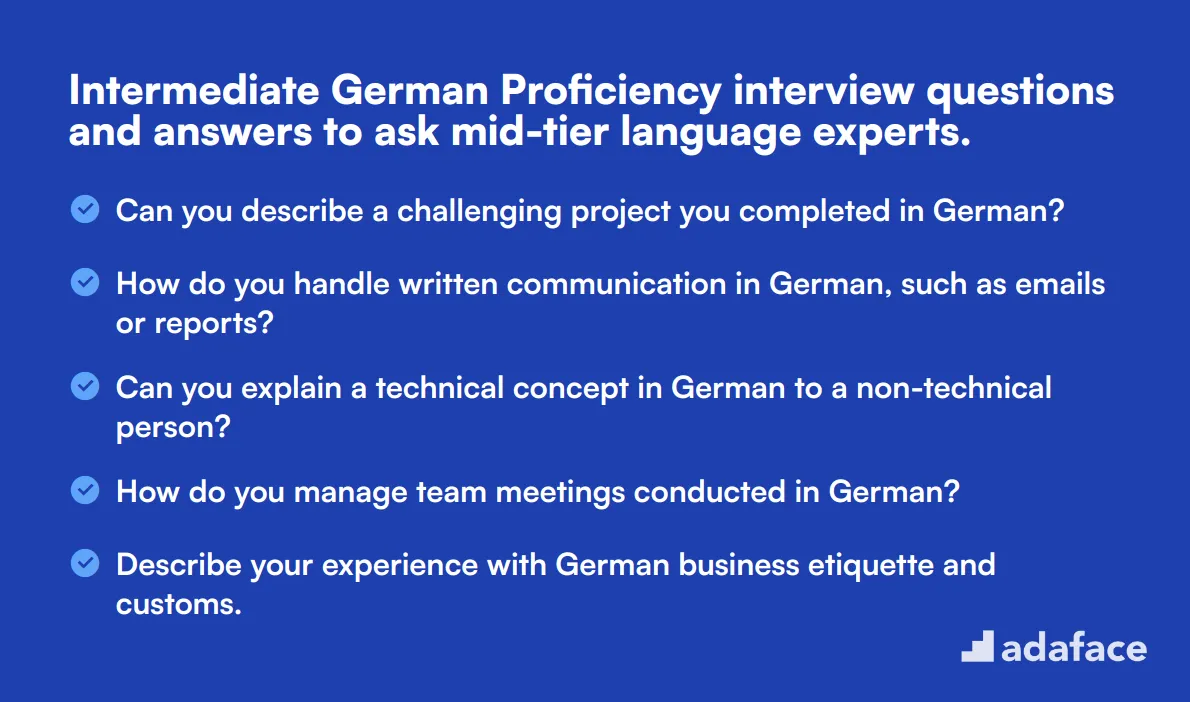
To determine whether your applicants have the right skills to handle mid-tier tasks in German, ask them some of these 15 intermediate German proficiency interview questions. These questions will help assess their fluency, cultural understanding, and ability to communicate effectively, ensuring they can perform well in a German-speaking environment. For further details, you can check out the job descriptions tailored for different roles.
- Can you describe a challenging project you completed in German?
- How do you handle written communication in German, such as emails or reports?
- Can you explain a technical concept in German to a non-technical person?
- How do you manage team meetings conducted in German?
- Describe your experience with German business etiquette and customs.
- How do you incorporate feedback received in German into your work?
- Can you discuss a time when you had to negotiate a deal or contract in German?
- What strategies do you use to improve your German vocabulary specific to your industry?
- Describe a situation where you had to give a presentation in German. How did you prepare for it?
- How do you ensure accuracy and clarity when translating technical documents into German?
- Can you explain how you handle written and spoken German differently in the workplace?
- What's your approach to conducting performance reviews or appraisals in German?
- How do you manage cross-cultural team dynamics where German is the primary language?
- Can you discuss your experience with German legal and compliance documents?
- How do you stay motivated to continually improve your German language skills?
7 German Proficiency interview questions and answers related to speaking proficiency
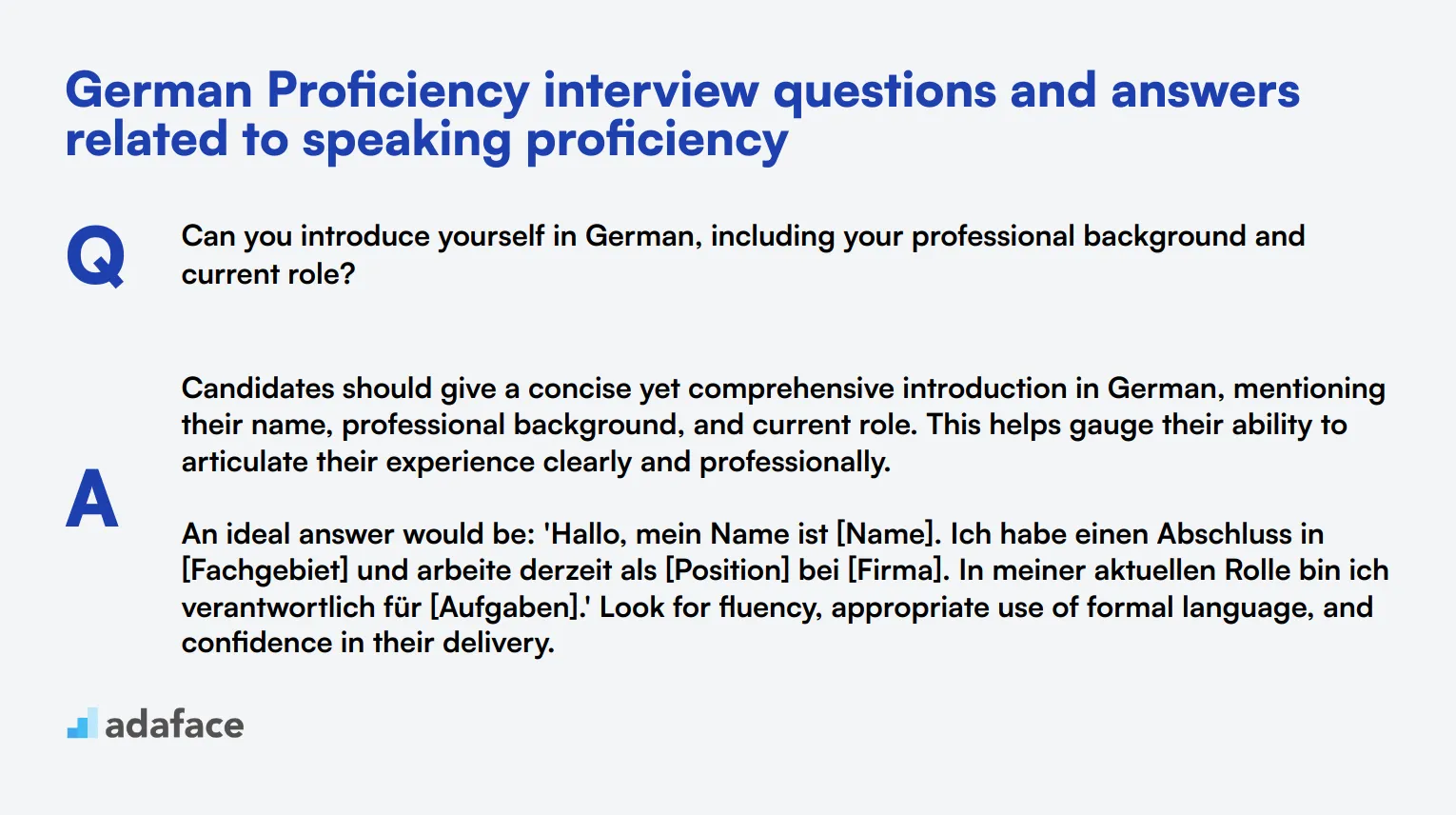
To ensure your candidates are genuinely proficient in spoken German, consider using these targeted interview questions. They will help you assess not just language skills, but also how well the candidate can navigate real-world conversations in a business context.
1. Can you introduce yourself in German, including your professional background and current role?
Candidates should give a concise yet comprehensive introduction in German, mentioning their name, professional background, and current role. This helps gauge their ability to articulate their experience clearly and professionally.
An ideal answer would be: 'Hallo, mein Name ist [Name]. Ich habe einen Abschluss in [Fachgebiet] und arbeite derzeit als [Position] bei [Firma]. In meiner aktuellen Rolle bin ich verantwortlich für [Aufgaben].' Look for fluency, appropriate use of formal language, and confidence in their delivery.
2. How do you handle a team meeting conducted entirely in German?
Candidates should describe their strategies for effectively participating and leading a team meeting conducted in German. They might mention preparing an agenda, taking notes in German, and encouraging participation from all team members.
A strong answer would include: 'Ich bereite eine detaillierte Agenda auf Deutsch vor und stelle sicher, dass alle Teammitglieder im Voraus informiert sind. Während des Meetings fördere ich die Teilnahme und stelle Fragen, um sicherzustellen, dass jeder versteht.' Look for organizational skills and the ability to manage a meeting in German.
3. Can you describe a situation where you had to give a presentation in German? How did you prepare for it?
Candidates should detail the steps they took to prepare for a presentation in German. This might include researching the topic, creating slides in German, and practicing their speech multiple times.
An effective answer could be: 'Ich habe gründlich recherchiert und meine Präsentation auf Deutsch vorbereitet, inklusive der Folien. Mehrmals übte ich meinen Vortrag, um sicherzustellen, dass ich fließend und selbstsicher sprechen kann.' Look for thorough preparation and the ability to deliver professional presentations in German.
4. How do you handle a conversation with a German-speaking customer who is upset or frustrated?
Candidates should explain their approach to de-escalating a tense situation with a German-speaking customer. They might mention active listening, empathy, and clear communication in German.
A good answer might include: 'Ich höre dem Kunden aufmerksam zu und zeige Verständnis für seine Situation. Dann erkläre ich auf Deutsch, wie wir das Problem lösen können.' Look for empathy, problem-solving skills, and the ability to communicate effectively in stressful situations.
5. Can you explain how you handle written communication in German, such as emails or reports?
Candidates should describe their approach to writing professional emails and reports in German. They might mention checking for grammatical accuracy, using formal language, and being clear and concise.
A strong response could be: 'Ich stelle sicher, dass meine E-Mails und Berichte grammatikalisch korrekt sind und eine formelle Sprache verwenden. Ich überprüfe immer meine Arbeit, um Missverständnisse zu vermeiden.' Look for attention to detail and proficiency in written German.
6. Describe a situation where you had to negotiate a deal or contract in German.
Candidates should recount a specific instance where they negotiated in German, detailing the preparation, key points of negotiation, and the outcome. They should demonstrate their ability to use persuasive language and understand legal terms in German.
An ideal answer would be: 'Ich bereitete mich gründlich vor, indem ich alle Vertragsdetails auf Deutsch durchging. Während der Verhandlungen stellte ich sicher, dass beide Parteien ihre Punkte klar verstanden. Am Ende konnten wir eine für beide Seiten vorteilhafte Vereinbarung treffen.' Look for negotiation skills, language proficiency, and the ability to achieve positive outcomes.
7. How do you ensure accuracy and clarity when translating technical documents into German?
Candidates should explain their process for translating technical documents, emphasizing the importance of accuracy and clarity. They might mention using specialized dictionaries, consulting with experts, and double-checking their work.
A strong answer would include: 'Ich benutze spezialisierte Wörterbücher und konsultiere Fachleute, um sicherzustellen, dass die Übersetzung korrekt ist. Ich überprüfe meine Arbeit sorgfältig, um sicherzustellen, dass sie klar und verständlich ist.' Look for attention to detail and proficiency in handling technical language.
12 German Proficiency questions related to writing skills
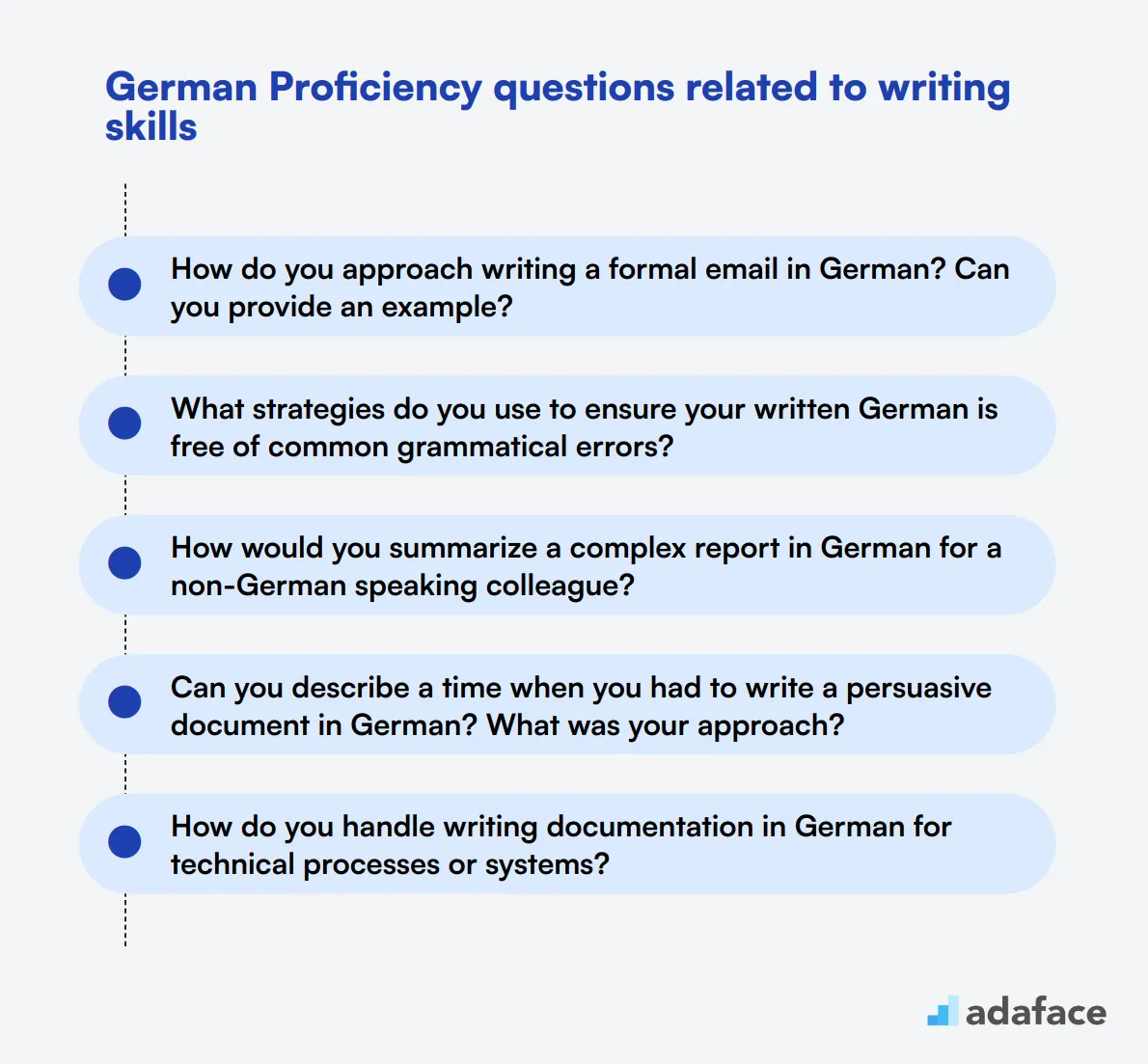
To evaluate a candidate's writing skills in German, use these specific questions during your interview process. They will help you gauge how effectively an applicant can communicate in written German, which is crucial for roles in various fields, including software development.
- How do you approach writing a formal email in German? Can you provide an example?
- What strategies do you use to ensure your written German is free of common grammatical errors?
- How would you summarize a complex report in German for a non-German speaking colleague?
- Can you describe a time when you had to write a persuasive document in German? What was your approach?
- How do you handle writing documentation in German for technical processes or systems?
- What tools or resources do you utilize to improve your writing skills in German?
- How do you structure a business proposal in German to make it compelling?
- Can you explain the importance of tone and style in written German communication?
- How do you adapt your writing style for different audiences in German?
- What is your process for proofreading and editing your written German work?
- Can you discuss a time when you received feedback on your written German? How did you implement it?
- How do you ensure clarity and precision in your written German, especially in technical documents?
10 situational German Proficiency interview questions for hiring top language experts
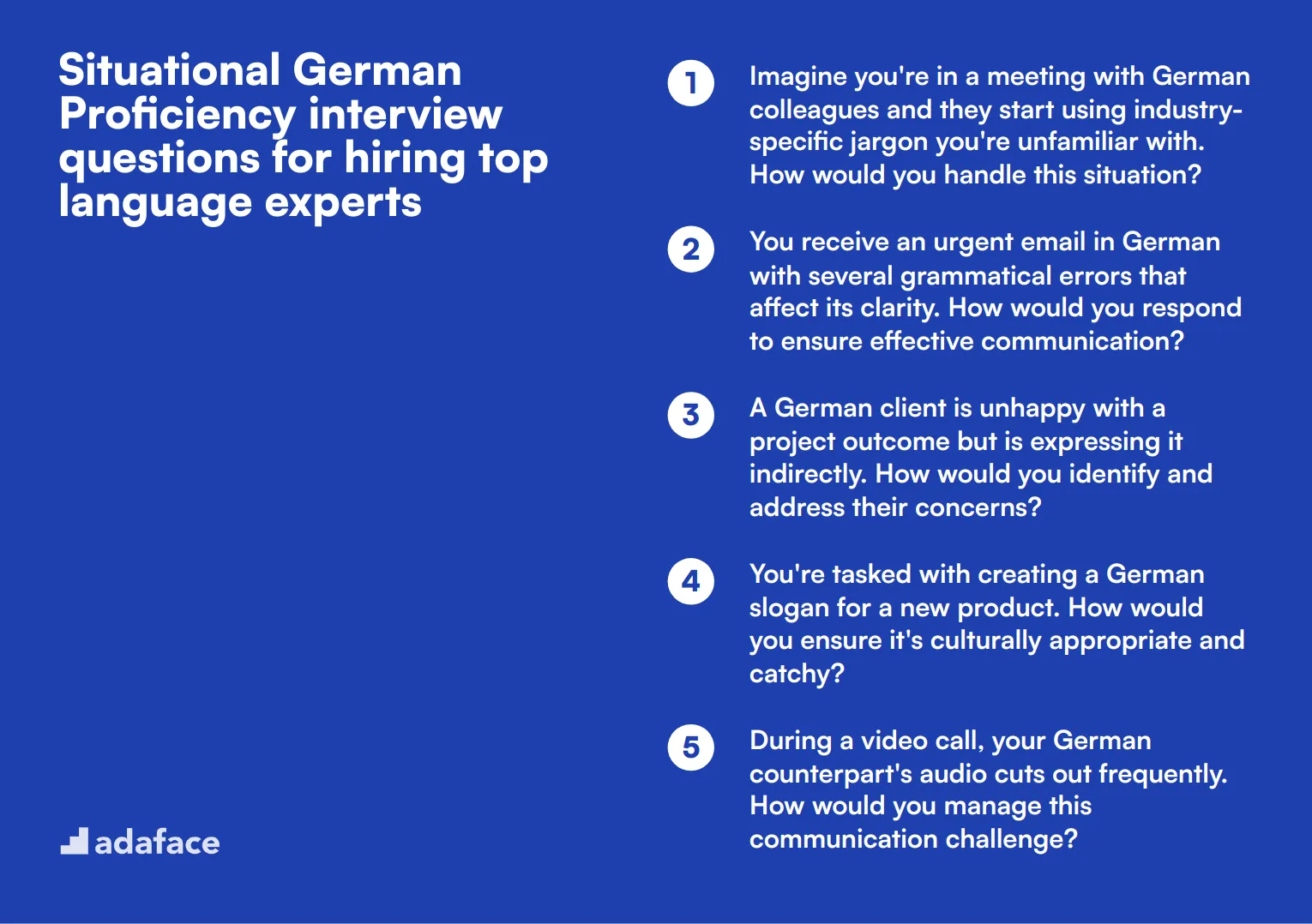
To assess candidates' ability to handle real-world scenarios in German, use these 10 situational questions. They help evaluate how applicants apply their language skills in practical, work-related contexts. These questions are designed to reveal a candidate's problem-solving abilities and cultural awareness in German-speaking environments.
- Imagine you're in a meeting with German colleagues and they start using industry-specific jargon you're unfamiliar with. How would you handle this situation?
- You receive an urgent email in German with several grammatical errors that affect its clarity. How would you respond to ensure effective communication?
- A German client is unhappy with a project outcome but is expressing it indirectly. How would you identify and address their concerns?
- You're tasked with creating a German slogan for a new product. How would you ensure it's culturally appropriate and catchy?
- During a video call, your German counterpart's audio cuts out frequently. How would you manage this communication challenge?
- You need to explain a delay in a project to a German stakeholder. How would you structure this conversation to maintain professionalism?
- A German team member consistently uses informal language in professional settings. How would you address this cultural misalignment?
- You're asked to give an impromptu speech in German at a company event. How would you prepare and deliver it effectively?
- A German document you're translating contains regional dialect. How would you ensure accurate translation for a broader audience?
- You notice a potentially offensive cultural reference in a German marketing campaign. How would you approach suggesting changes?
Which German Proficiency skills should you evaluate during the interview phase?
Assessing a candidate's German proficiency in a single interview is challenging. However, there are key skills that can provide valuable insights into their capabilities and suitability for your organization.
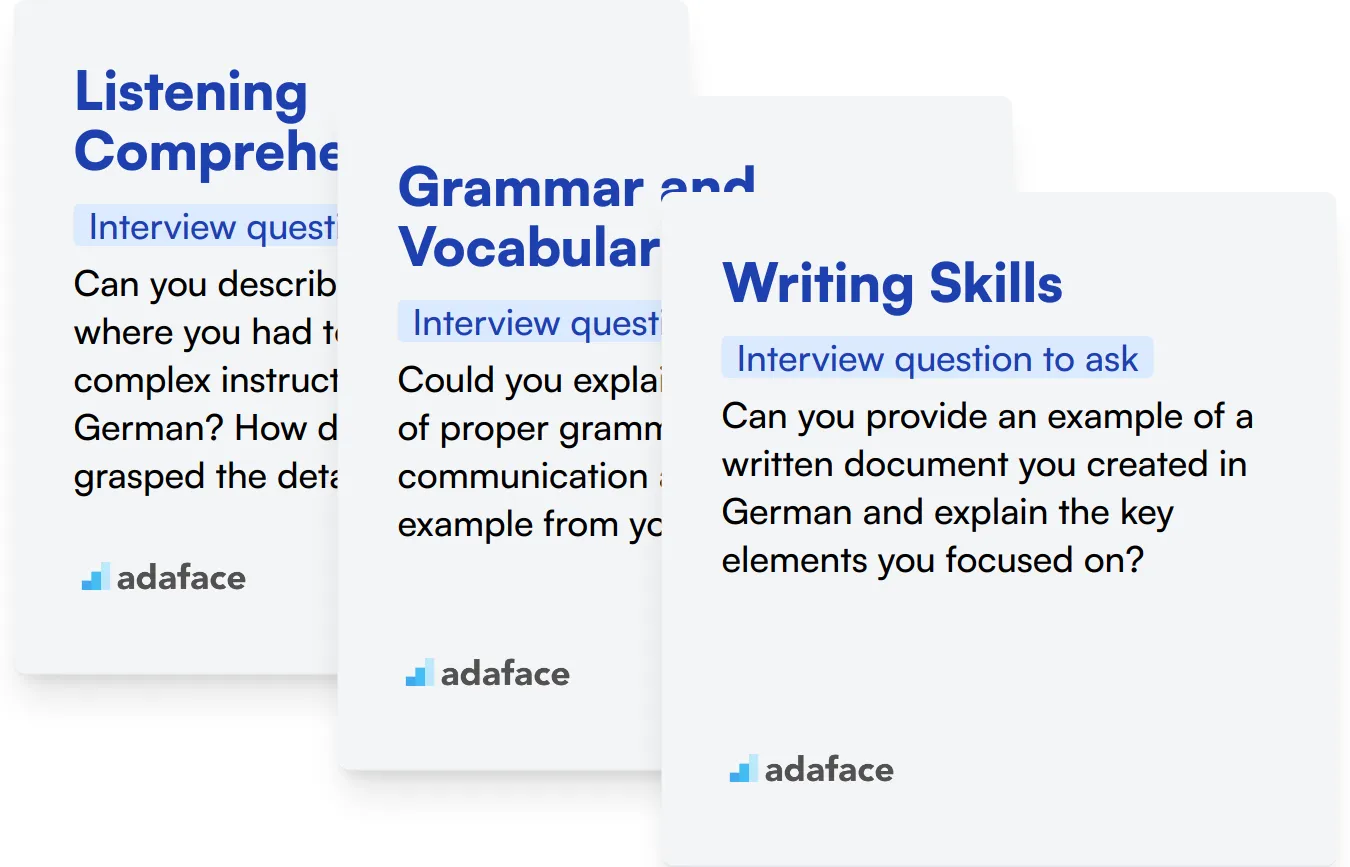
Listening Comprehension
To evaluate listening comprehension, consider using a tailored assessment test that includes multiple-choice questions focused on listening skills. Our German intermediate B1 test can be a useful resource.
In addition to assessments, you can ask targeted interview questions to gauge this skill.
Can you describe a situation where you had to understand complex instructions given in German? How did you ensure you grasped the details?
When asking this question, look for the candidate's ability to recall specific details and their strategies for ensuring comprehension. This will indicate their listening proficiency and attention to detail.
Grammar and Vocabulary
You might consider utilizing an assessment test that incorporates multiple-choice questions to evaluate a candidate's grammar and vocabulary skills. For instance, the Grammar & Vocabulary test can serve as a good benchmark.
Moreover, you can pose specific questions that require the use of proper grammar and vocabulary.
Could you explain the importance of proper grammar in professional communication and provide an example from your experience?
Pay attention to how the candidate articulates their thoughts and whether they use correct grammatical structures. This will reveal their depth of understanding and their ability to communicate clearly.
Writing Skills
To assess writing skills, consider an assessment test that includes multiple-choice questions specifically designed to evaluate writing proficiency. Our German proficiency test could provide relevant insights.
You can also ask questions that require the candidate to elaborate on their writing experiences.
Can you provide an example of a written document you created in German and explain the key elements you focused on?
Look for clarity, structure, and vocabulary usage in their response. This will help you determine their writing capabilities and how they prioritize effective communication.
Strategic Tips for Implementing German Proficiency Interview Questions
Before you start implementing the German proficiency interview insights, here are our top tips to ensure you're leveraging them effectively.
1. Incorporate Skill Assessments Pre-Interview
Using skill tests before the interview process can significantly enhance the efficiency of candidate evaluation. These tests help filter the candidate pool, ensuring only those with the necessary language skills advance to the interview stage.
For German proficiency, consider using Adaface assessments like the German Basic A1 Test for beginners or the German Proficient C1 Test for advanced candidates. Each test is designed to evaluate different levels of language proficiency accurately.
Implementing these tests early in the recruitment process helps save time and resources, allowing you to focus on candidates who have already demonstrated a certain level of language competency. Let's move on to structuring your interview questions next.
2. Carefully Select Interview Questions
Effective interviews require strategic question selection, especially given the limited time to assess candidates. Focus on constructing a set of questions that cover essential language skills without overwhelming the interview.
In addition to German language skills, consider integrating questions related to other relevant areas such as communication or cognitive abilities, which can give further insight into the candidate's overall profile and fit for the role.
3. Utilize Follow-Up Questions for Depth
Relying solely on predefined interview questions may not suffice. Follow-up questions are essential for probing deeper into a candidate's responses and authenticity.
For instance, if a candidate mentions experience with multicultural teams, ask a follow-up about the challenges faced and solutions provided. This helps assess real-world application of their language skills and adaptability.
Utilize German Proficiency interview questions and skills tests to hire talented language specialists
If you are looking to hire someone with German language skills, it is important to ensure they possess these skills accurately. The most efficient way to do this is by using language skills tests, such as the German Basic A1 Test or the German Proficient C1 Test.
Once you use these tests, you can effectively shortlist the best applicants for interviews. To take the next step, consider signing up on our platform and explore our comprehensive test library for more options.
German (Basics/A1) test
Download German Proficiency interview questions template in multiple formats
German Proficiency Interview Questions FAQs
Assessing German proficiency ensures that candidates have the necessary language skills to communicate effectively and perform their job duties.
Common types include questions about speaking proficiency, writing skills, situational scenarios, and role-specific language tasks.
You can evaluate speaking proficiency by asking candidates to participate in a conversation, describe a scenario, or solve a problem verbally.
Look for correct grammar, vocabulary usage, clarity, and the ability to convey complex ideas in written German.
Yes, combining standardized tests with interview questions can provide a more comprehensive assessment of a candidate's German proficiency.

40 min skill tests.
No trick questions.
Accurate shortlisting.
We make it easy for you to find the best candidates in your pipeline with a 40 min skills test.
Try for freeRelated posts
Free resources




